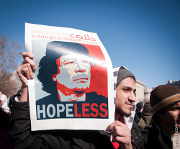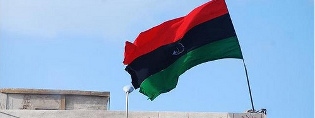
Libya (MNN) — Libya's anti-government protests have spread
to the capital city.
The Libyan government is
restricting the flow of information and has shut down access to the Internet and
mobile phone systems.
However, news reports that have
been verified indicate that in some places, security forces have taken up the
cause of the protesters. The fact that
the tumult is reportedly spreading also points to a common cause, which
unexpectedly brought an effect not seen since the late 1920s.
Steve Johnson with Biblica says the
rallying cry has been for freedom. "It
brought them together around a common cause. I think we're seeing that in Libya
right now; we're seeing it in Bahrain. We're seeing it to some degree in Iran
and other places, where this domino effect really is taking place."
Unity among Libya's tribes? To a
certain degree, yes. Johnson explains: "The
unity is a little bit surprising. But I think that it's indicated to us that
there's a cry for freedom that's being felt by people across every sector of
society."
The cry for freedom was sparked
by outrage in Tunisia and quickly spread through Egypt and other countries in
the Middle East. Libya has been dealing
with calls for change from a 40-year reign under General Moammar Gadhafi.
Already, demonstrations in Egypt
ousted a longstanding president and caused ripple effects in other
governments. However, there remain
concerns over what a new government will look like and whether or not
attitudes will change toward Christians.
Nine of the countries caught up
in the freedom revolution share one thing in common: they are all in the top 50
nations listed on the Open Doors World Watch List. The list represents countries where the
persecution of believers is the worst. That begs the question: Will the new freedoms include the Christians?
Johnson says it's best to be
prepared. "I think the Christian
community needs to be prepared to respond regardless of which way it goes,
because I think the cry for freedom that we're clearly seeing right now throughout
the Middle East is also, on some levels, a cry for spiritual freedom."
Security issues prevent Johnson from
sharing the details, but they've already been working to create Scripture
access creatively in many of these areas in the Middle East and North Africa.
"Working in the Middle East really forces any ministry, including Biblica, to
be very creative about the way we operate, because again, regardless of which
way the political change blows, we know that there will always be religious
resistance in that part of the world."
Johnson adds that prayer will
continue to encourage the remnant church. "Pray that these new governments will
be more receptive to religious freedom and to the spread of the Gospel. Number
two, pray for the people that are involved in the spread of the Gospel that
are trying to bring spiritual freedom along with the cry for political freedom.
These people often risk their lives by doing what they do." There's more here.

